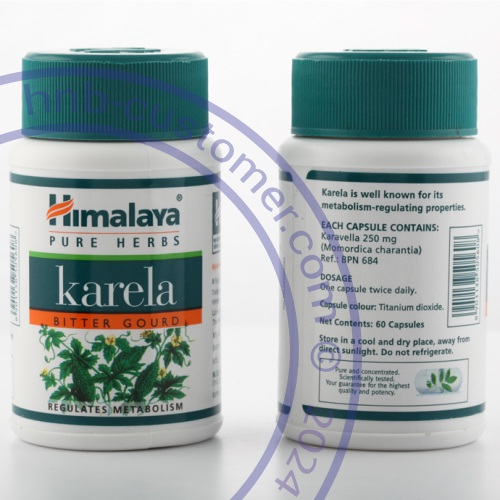

Brand(s):
- Karela
Manufacturer:
- Himalaya Herbals
Disease(s):
- Diabet
- We deliver to any place on Earth
- Complete anonymity and data security
- Only certified products and attractive prices
- No fuss and long queues to get medicines
Karela | Bitcoin Pharmacy
Karela


Brand(s):
- Karela
Manufacturer:
- Himalaya Herbals
Disease(s):
- Diabet
Karela bottle
What is this herbal medicine?
KARELA (Bitter Melon/Bitter Gourd/Momordica charantia) offers a host of medicinal benefits and is a key herb in Ayurvedic medicine. Recent medical studies have indicated that Karela contains a ‘plant-insulin’ which helps in lowering blood sugar levels. The juice of the plant is helpful in treating alcohol-induced hepatotoxicity. Karela is commonly eaten in Asia. In fact, Health Canada recommends eating Karela on their website under ‘Treat Your Taste Buds’, suggesting Karela as an unique, new nutritious food to try (Choosing Vegetables and Fruits, Health Canada, February 2008). Karela is a tropical, bitter vegetable mainly cultivated in a few Asian and African countries.
Active constituents
The fruit and seed contain a polypeptide, p-insulin, which is considered similar structurally and pharmacologically to bovine insulin (Fitoterapia, 60, 1989, Chemical Abstract 112, 1990). The seed and fruit contain an inhibitor of HIV, MAP-30 (momordica anti-HIV-protein) which exhibits antiviral and antitumor activity in vitro (Chemical Abstract, 113, 1990; Fitoterapia, 117, 1992). Another protein, MRK-29 found in the seed and fruit of a smaller variety of Karela originating from Thailand, inhibits HIV reverse transcriptase and increases the tumor necrosis (killing tumorous cells) factor (Planta Medica, 67, 2001, Natural Medicines Comprehensive Database 2007). It is also rich in vitamins A and C, beta carotene, as well as the minerals phosphorous, iron and potassium.
Herb functions:
- Antidiabetic: Karela helps support normal blood sugar levels with compounds called charantin and momordicin. Additional key compounds such as vicine, peptides and polypeptide-p (plant insulin) work together to lend the vegetable-fruit its antihyperglycemic potency. Karela enhances peripheral glucose utilization and increases serum protein levels. It also increases glucose absorption and fatty acid oxidation and improves insulin sensitivity. Karela significantly reduces hyperglycemia, glycated hemoglobin (Hb A1C) levels, total cholesterol levels and free fatty acid levels (Diabetes Research and Clinical Practice, August 2008, 81(2), 134–43).
- Insulinomimetic (insulin-like): Insulin is responsible for maintaing normal glucose levels in the blood. Karela, by its insulin-like action and by increasing the secretion of insulin, helps in reducing excessive blood glucose levels. Karela also possesses antioxidant properties which help in reducing the risk of diabetic complications by scavenging free radicals.
- Hepatoprotective: The fruit extract was found to significantly increase the active liver enzymes glutathione s-transferase, glutathione peroxidase and catalase, which suggest the role of Karela in preventing hepatotoxicity (International Journal of Pharmaceutical Sciences Review and Research, Volume 1, Issue 2, March/April 2010).
- Hypolipidemic: The compounds in Karela improve lipid profiles. They reduce the secretion of apolipoprotein B by the liver which is the primary lipoprotein present in low density or ‘bad’cholesterol. Karela reduces apolipoprotein C-III, the protein found in low-density cholesterolwhich turns into LDL cholesterol. Karela increases apolipoprotein A-1, the major protein component of high-density or ‘good’ cholesterol. It also lowers cellular triglyceride content. Karela fruit and seeds have been shown to reduce total cholesterol and triglyceride levels both when dietary cholesterol is absent and present (International Journal of Pharmaceutical Sciences Review and Research, Volume 1, Issue 2, March/April 2010).
- Antipsoriatic: Karela inhibits the enzyme guanylate cyclase, which may benefit people with psoriasis.
Indications:
- As an adjuvant in diabetes mellitus
Contraindications:
None
Recommended dose:
One capsule, twice a day or as directed by your physician
Composition
Each capsule contains 250mg extract of Karela
Note: The information on this page is not intended to be a substitute for professional medical advice. Do not use this information to diagnose or treat your problem without consulting your doctor.










